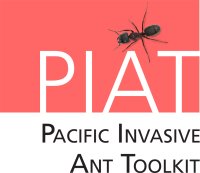Regional organizations
Biosecurity in the Pacific is coordinated by two main organisations:
- Secretariat of the Pacific Regional Environment Programme / Le Secrétariat du Programme Régional Océanien de l'Environnement (SPREP / PROE)
- Secretariat of the Pacific Community/Communautė du Pacifique (SPC).


The responsibilities of SPC and SPREP in relation to biosecurity are complementary. SPREP and SPC co-produced Guidelines for Invasive Species Management in the Pacific. Schedule A3 in these guidelines outlines the principal objectives of a regionally coordinated approach to biosecurity legislation. These objectives include:
- review of each member country’s biosecurity legislation, identifying gaps, inconsistencies and conflicts
- develop and distribute legislative guidelines covering all aspect of invasive species management
- ensure participation of all stakeholders at multiple levels in the development and implementation of legislation
- incorporate economic principles into national legislation
- develop mechanisms to improve compliance and enforcement
- periodically review regional policies and procedures to manage trade
- promote membership contributions to international conventions
- ensure national, regional and international policy making are consistent
In essence SPC is responsible for support regarding international inbound biosecurity and pest management and supports in-country National Plant Protection Organizations (NPPO) on inter-island domestic biosecurity. SPREP is responsible for support regarding inter-island domestic biosecurity and advice on invasive species management.
SPREP
The Secretariat of the Pacific Regional Environment Programme is responsible for assisting the governments and administrations of the Pacific region with the protection and sustainable development of the region's environment.
The Invasive Species Programme sits within the Biodiversity and Ecosystem Management Division and aims to assist members with their invasive species issues and programmes. The programme addresses invasive species as a cross-cutting issue working with other divisions of SPREP (Climate Change, Pollution and Waste Management, Environmental Monitoring and Governance) on their focal areas and with SPC to ensure environmental issues are considered in regards to national and inter-island biosecurity.
The Programme coordinates both the Pacific Invasive Learning Network (PILN) and the Pacific Invasives Partnership and works with many partners to ensure that invasive species management is both effective and efficient in the Pacific region.
SPC
Specifically in relation to ants SPC is responsible for implementation of the Pacific Invasive Ant Prevention Programme (PIAPP). The goal of the PIAPP is to prevent Red Imported Fire Ant (RIFA) and other invasive ant species with economic, environmental and/or social impacts, entering and establishing in or spreading between (or within) countries of the Pacific Region.
SPC’s Biosecurity and Trade Support (BATS) team are mandated to support biosecurity among member nations in the Pacific region. BATS mission statement objectives aim to build a compatible regional biosecurity legislation framework applicable to ants:
- National capacity to comply with international and other relevant standards strengthened
- upgrade and maintain national border biosecurity (quarantine) services and biosecurity related trade services including harmonization of laws and procedures
- compliance with international standards
- Improved information available on plant and animal health status
- to comply with the requirements of importing countries and ensure imports comply with their own requirements and thus reducing the risks of introducing new pests and diseases due to increased trade and movement of people
- maintain efficient databases for rigorous and up-to-date, readily accessible records of the complete list of all pests and diseases of plants and animals essential for countries of the Pacific to produce credible quarantine import protocols (based on IRAs) and to make acceptable market access submissions for exports
- assist PICTs develop national biosecurity facility based on the regional model to enable improved biosecurity operations and risk based decision-making on biosecurity issues and maintain a biosecurity alert and information service to rapidly inform PICTs of imminent pest and disease threats and to provide precautionary technical advice
- National capacity to increase domestic and export trade developed and strengthened
- to conduct import risk analysis
- develop import protocols
- develop trade access submissions
The secretariat also offers guidance on standard setting institutions and other areas of Biosecurity Legislation.
Content reviewed by Josua Wainiqolo, SPC BATS, and David Moverley, SPREP, October 2016; Souad Boudjelas, Pacific Invasives Initiative, November 2016
